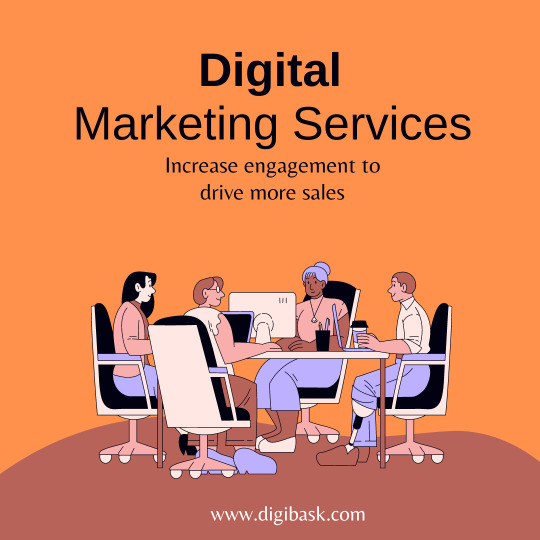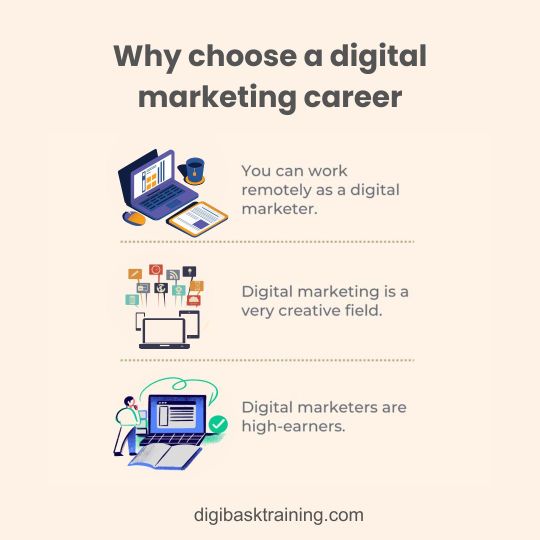Text
How Digital Marketing Agencies Can Support Small Businesses
Small firms have particular potential and challenges in the current digital era. Operating on a tight budget while competing with larger organizations calls for creative marketing ideas and strategic thinking. With the knowledge and tools they offer to help small businesses succeed, digital marketing agencies are essential in assisting them in navigating this challenging environment. Here's how digital marketing companies can effectively help small businesses.
Understanding the Unique Needs of Small Businesses
Small businesses often operate with tight budgets and limited resources. Unlike large corporations, they may not have in-house marketing teams or the ability to execute extensive marketing campaigns. Digital marketing agencies understand these constraints and tailor their services to meet the specific needs of small businesses. By offering scalable solutions and flexible pricing models, agencies can provide effective marketing strategies without breaking the bank.
Customized Marketing Strategies
One of the primary benefits digital marketing agencies offer small businesses is the development of customized marketing strategies. Every small business is unique, with its own set of goals, target audience, and competitive landscape. Digital marketing agencies conduct thorough market research to understand these variables and create tailored strategies that align with the business’s objectives. This personalized approach ensures that marketing efforts are targeted and efficient, maximizing the return on investment (ROI).
Leveraging Data Analytics
Data analytics is a powerful tool in the digital marketing arsenal. By analyzing data from various channels, digital marketing agencies can provide small businesses with valuable insights into customer behavior, market trends, and campaign performance. These insights enable businesses to make informed decisions and adjust their strategies in real time. For small businesses, leveraging data analytics can lead to more effective marketing campaigns and better resource allocation.
Enhancing Online Presence
A strong online presence is essential for small businesses to compete in the digital marketplace. Digital marketing agencies help small businesses enhance their online presence through various strategies, including search engine optimization (SEO), social media marketing, content marketing, and pay-per-click (PPC) advertising. By optimizing websites for search engines, creating engaging content, and running targeted ad campaigns, agencies can increase visibility and drive traffic to small business websites.
Building Brand Awareness
Brand awareness is crucial for small businesses looking to establish a foothold in their market. Digital marketing agencies use a combination of strategies to build and enhance brand awareness. Social media marketing, for instance, allows businesses to engage with their audience and build a community around their brand. Content marketing, on the other hand, positions the business as an authority in its industry by providing valuable information and insights to potential customers. Through consistent and strategic efforts, agencies help small businesses develop a recognizable and trusted brand.
Cost-Effective Advertising
Traditional advertising methods can be expensive and may not always deliver the desired results for small businesses. Digital marketing agencies offer more cost-effective advertising solutions that can be easily scaled and adjusted. For example, PPC advertising allows businesses to set their budget and only pay when someone clicks on their ad. Social media ads can be targeted to specific demographics, ensuring that the marketing budget is spent reaching the most relevant audience. These cost-effective methods allow small businesses to maximize their marketing spend and achieve better ROI.
Providing Technical Expertise
Digital marketing involves a range of technical skills and knowledge, from SEO and web development to data analytics and digital advertising. Small businesses may not have the expertise or resources to handle these aspects in-house. Digital marketing agencies provide the technical expertise required to execute sophisticated marketing strategies. By partnering with an agency, small businesses can access a team of experts who are up-to-date with the latest industry trends and technologies.
Fostering Long-Term Growth
Digital marketing is not just about short-term gains; it’s also about fostering long-term growth. Digital marketing agencies help small businesses build a solid foundation for sustained success. Through ongoing optimization and continuous improvement, agencies ensure that marketing strategies evolve with changing market conditions and consumer behavior. This proactive approach helps small businesses stay competitive and grow over time.
Conclusion
Digital marketing agencies are invaluable partners for small businesses looking to thrive in the digital age. By providing customized strategies, leveraging data analytics, enhancing online presence, building brand awareness, offering cost-effective advertising solutions, providing technical expertise, and fostering long-term growth,DigiBask is one of the best digital marketing company in kanpur, Provides one of the best services in kanpur. you can make an informed decision and choose our service that will help you achieve your goals and grow your business online. digital marketing agencies help small businesses achieve their goals and reach new heights.
0 notes
Text

0 notes
Text
The Ethical Considerations in Digital Marketing: Privacy and Data Protection
In today's digital age, where personal data is collected, processed, and utilized at an unprecedented scale, ethical considerations in digital marketing have become more critical than ever before. As businesses harness the power of technology to target their audience with precision, questions surrounding privacy and data protection have come to the forefront. In this article, we delve into the ethical implications of digital marketing practices, focusing on the importance of safeguarding user privacy and data protection.
1. Respect for Privacy
Respecting user privacy should be the cornerstone of any digital marketing strategy. Consumers entrust businesses with their personal information when they interact online, whether it's through social media, email, or website browsing. Therefore, it's essential for businesses to be transparent about how they collect, store, and use this data. Clear and concise privacy policies should be provided to users, outlining what information is being collected, how it will be used, and whether it will be shared with third parties.
2. Obtaining Consent
Obtaining explicit consent from users before collecting their personal data is not only a legal requirement in many jurisdictions but also an ethical imperative. Consent should be freely given, specific, informed, and unambiguous. Businesses should refrain from using deceptive tactics or hidden clauses to obtain consent. Instead, they should provide users with clear opt-in mechanisms and the option to withdraw consent at any time.
3. Data Minimization
Practicing data minimization involves collecting only the data that is necessary for a specific purpose and limiting the amount of personal information stored to the bare minimum. By adopting a data minimization approach, businesses can reduce the risk of data breaches and unauthorized access while respecting user privacy. Moreover, collecting less data also minimizes the potential for misuse or exploitation of personal information.
4. Data Security
Ensuring the security of user data is paramount in digital marketing. Businesses must implement robust security measures to protect against unauthorized access, data breaches, and cyberattacks. This includes encryption, firewalls, access controls, and regular security audits. By safeguarding user data, businesses can build trust with their audience and mitigate the risk of reputational damage.
5. Honesty and Transparency
Honesty and transparency should guide all interactions between businesses and consumers in the digital realm. This means being upfront about advertising practices, sponsored content, and affiliate partnerships. Businesses should refrain from using deceptive tactics or misleading advertising to manipulate consumer behavior. Instead, they should strive to build authentic relationships with their audience based on trust and integrity.
6. Accountability and Compliance
Businesses have a responsibility to comply with relevant data protection laws and regulations, such as the General Data Protection Regulation (GDPR) in the European Union or the California Consumer Privacy Act (CCPA) in the United States. Compliance with these laws not only protects user privacy but also demonstrates a commitment to ethical conduct. Additionally, businesses should appoint a data protection officer (DPO) or designate someone responsible for overseeing data protection efforts and ensuring accountability.
Conclusion
In conclusion, ethical considerations in digital marketing, particularly regarding privacy and data protection, are of paramount importance in today's interconnected world. By respecting user privacy, obtaining consent, practicing data minimization, ensuring data security, being honest and transparent, and adhering to legal and regulatory requirements, businesses can build trust with their audience and foster positive relationships that drive long-term success. In Kanpur's dynamic market, where businesses vie for digital visibility, selecting the right digital marketing agency kanpur is pivotal. A reputable agency possesses localized expertise, understanding the region's nuances, consumer behaviors, and regulatory landscape. This insight enables them to tailor ethical digital strategies that resonate with Kanpur's audience while upholding privacy and data protection principles.
0 notes
Text

#services#growyourbusiness#business#digital marketing services#web development services#android app development#software development
0 notes
Text
From Concept to Launch: The Journey of a Software Product
Creating a software product is an exciting journey that starts with an idea and culminates in a finished product that users can interact with. This process involves several stages, each critical to the overall success of the software. Here, we'll break down the steps from concept to launch in a way that's easy to understand.
1. Ideation and Conceptualization
Every software product starts with an idea. This could be a solution to a problem, a new way to accomplish a task, or an innovative product that doesn’t exist yet. During this stage, brainstorming sessions help to refine the idea. Key questions to consider include:
What problem does the software solve?
Who is the target audience?
What features will it include?
Creating a clear and concise concept is crucial. This involves writing down the idea, drawing sketches, and maybe even creating a simple prototype or wireframe.
2. Market Research and Feasibility Study
Analyzing competitors: Understand what similar products exist and what they offer.
Identifying target users: Who will use your product and what are their needs?
Assessing demand: Is there a genuine need for your product?
A feasibility study will help determine if the idea is viable. This includes evaluating the technical, financial, and operational aspects of the project.
3. Planning and Requirement Analysis
Once the concept is validated, the next step is detailed planning. This includes:
Defining the project scope: What will the product do?
Creating a project timeline: How long will it take to develop?
Budgeting: How much will it cost?
Requirement analysis involves gathering detailed specifications. This is usually done through meetings with stakeholders, potential users, and the development team. The goal is to create a comprehensive list of features and functions that the software will include.
4. Design
The design phase is about creating the user experience (UX) and user interface (UI). This includes:
Wireframes: Simple sketches that show the layout of the software.
Mockups: Detailed designs that include colors, fonts, and graphics.
Prototypes: Interactive models that simulate the user experience.
Good design is crucial because it impacts how users interact with the software.
5. Development
Development is the process of actually building the software. This stage is usually divided into smaller tasks or sprints (in Agile methodology). Key activities include:
Coding: Writing the code that makes the software function.
Unit Testing: Testing individual components to ensure they work correctly.
Integration: Combining different parts of the software and ensuring they work together.
Developers use various tools and programming languages depending on the requirements.
6. Testing
Once the software is developed, thorough testing is essential. This includes:
Functional Testing: Ensuring the software works as intended.
Usability Testing: Making sure it’s easy to use.
Performance Testing: Checking how the software performs under different conditions.
Security Testing: Ensuring the software is secure and free from vulnerabilities.
Testing is an iterative process. Bugs and issues are identified, fixed, and then retested.
7. Deployment
After testing, the software is ready for deployment. This involves:
Setting up the production environment: Ensuring the servers and infrastructure are ready.
Data Migration: Transferring data from old systems, if necessary.
Final Testing: Performing one last round of tests to ensure everything works in the live environment.
Deployment can be done in stages or all at once. Staged deployment (also known as phased rollout) helps identify and fix any issues with a smaller user base before a full-scale launch.
8. Launch
The launch is the moment when the software becomes available to users. This involves:
Marketing: Promoting the software through various channels to attract users.
Support: Setting up support systems to help users with any issues they encounter.
Monitoring: Keeping an eye on the software’s performance and user feedback.
A successful launch requires coordination between development, marketing, and support teams.
9. Post-Launch Support and Maintenance
After launch, the journey doesn’t end. Ongoing support and maintenance are critical to the software’s success. This includes:
Bug Fixes: Addressing any issues that users report.
Updates: Adding new features and improvements.
Performance Monitoring: Ensuring the software runs smoothly.
Regular updates help keep the software relevant and improve user satisfaction.
Conclusion
From concept to launch, developing a software product is a complex but rewarding process. It involves careful planning, detailed design, rigorous testing, and continuous improvement. By following these steps, you can ensure your software product meets the needs of your users and achieves success in the market. if you’re seeking for software development services. One of the greatest best software development company in kanpur is offered by DigiBask. You can choose our service with knowledge, and it will assist you in reaching your objectives and, Remember, the journey doesn’t end at launch. Ongoing support and enhancements are crucial to maintaining the software’s relevance and user satisfaction. With dedication and a clear process, you can turn your software idea into a successful product.
0 notes
Text

0 notes
Text
How Digital Marketing Training Can Boost Your Career Prospects
In today's fast-paced digital world, having the right skills is crucial for career success. One field that's constantly evolving and in high demand is digital marketing. Whether you're a recent graduate, a seasoned professional looking to switch careers, or someone wanting to upskill, digital marketing training can be your ticket to unlocking exciting career prospects.
Understanding Digital Marketing Training
Digital marketing training encompasses a wide range of skills and techniques aimed at promoting products or services using digital channels. These channels include websites, social media platforms, search engines, email, and more. Through comprehensive training programs, individuals can learn how to effectively leverage these channels to reach target audiences, drive engagement, and ultimately, achieve business objectives.
Building In-Demand Skills
One of the most significant benefits of digital marketing training is acquiring in-demand skills that are highly sought after by employers across various industries. These skills include:
Search Engine Optimization (SEO): Understanding how to optimize content for search engines is essential for improving online visibility and driving organic traffic to websites.
Social Media Marketing: Learning how to create engaging content, run targeted ads, and analyze metrics on platforms like Facebook, Instagram, and LinkedIn can help businesses connect with their audience and build brand awareness.
Content Marketing: Crafting compelling content that resonates with the target audience is crucial for attracting and retaining customers. Digital marketing training teaches individuals how to create content that educates, entertains, and inspires action.
Pay-Per-Click (PPC) Advertising: Mastering PPC advertising platforms like Google Ads and Bing Ads enables marketers to create targeted campaigns, optimize ad spend, and achieve measurable results.
Analytics and Data Interpretation: Understanding how to analyze data and derive actionable insights is essential for making informed marketing decisions and optimizing campaign performance.
Opening Doors to Diverse Career Opportunities
Digital marketing training opens doors to diverse career opportunities across industries such as e-commerce, advertising, media, technology, and more. Whether you're interested in working for a multinational corporation, a small business, or even starting your own venture, the skills gained through digital marketing training are highly transferable and applicable to various roles, including:
Digital Marketing Specialist
Social Media Manager
Content Strategist
SEO Analyst
Email Marketing Specialist
Digital Advertising Manager
Analytics Manager
Marketing Consultant
Adaptability in a Dynamic Industry
Digital marketing training equips individuals with the knowledge and skills to adapt to these changes effectively. By staying up-to-date with the latest industry trends, tools, and best practices, professionals can remain competitive in the job market and continuously add value to their organizations.
Advancing Your Career Trajectory
Investing in digital marketing training can significantly enhance your career trajectory. Whether you're looking to climb the corporate ladder, pursue leadership positions, or transition into a specialized area of digital marketing, acquiring advanced skills through training can position you as a valuable asset to employers.
Conclusion
digital marketing training offers numerous benefits for individuals looking to boost their career prospects. From acquiring in-demand skills and opening doors to diverse career opportunities to staying adaptable in a dynamic industry and advancing your career trajectory, the advantages are clear. Whether you're a recent graduate or a seasoned professional and If you're in Kanpur and looking to enhance your career prospects, consider enrolling in the best digital marketing course in Kanpur. This training can provide you with the skills and knowledge needed to thrive in the digital age.
0 notes
Text
A Comprehensive Guide to Understanding the Website Development Process
A well-crafted website is the cornerstone of a successful online presence for businesses of all sizes. From small startups to multinational corporations, understanding the website development process is essential for creating a compelling and functional digital platform that engages users and drives business growth. In this guide, we'll explore each stage of the website development journey, from conceptualization to launch, providing insights into key considerations and best practices along the way.
1. Conceptualization: Defining Your Vision
The website development process begins with a clear understanding of your goals and objectives. Whether you're launching a new business or revamping an existing one, it's crucial to define your target audience, identify your unique selling propositions, and establish the desired functionalities of your website. This stage involves brainstorming sessions, market research, and stakeholder consultations to ensure alignment between your vision and the expectations of your audience.
2. Planning and Strategy: Building a Solid Foundation
Once your vision is defined, it's time to create a detailed plan and strategy for your website. This includes defining the site architecture, outlining the user journey, and developing a content strategy. Wireframing tools can help visualize the layout and navigation of your site, while keyword research and SEO best practices should inform your content strategy to maximize visibility and reach. Collaboration between designers, developers, and content creators is essential to ensure a cohesive and effective strategy.
3. Web Design and Development
The design phase involves creating visually appealing layouts, selecting color schemes, and choosing typography that reflects your brand identity. User experience (UX) design principles should guide the development of intuitive navigation and interactive elements that enhance user engagement. Meanwhile, developers use coding languages such as HTML, CSS, and JavaScript to translate design concepts into functional web pages, ensuring compatibility across devices and browsers.
4. Testing and Optimization: Ensuring Quality and Performance
Once the initial development is complete, thorough testing is essential to identify and address any bugs or usability issues. This includes functional testing to ensure all features work as intended, compatibility testing to ensure consistency across different devices and browsers, and performance testing to optimize loading times and responsiveness. User testing and feedback can provide valuable insights into usability and accessibility, helping to refine the design and functionality of your site before launch.
5. Deployment and Launch: Going Live
With testing complete and feedback incorporated, it's time to deploy your website and launch it to the world. This involves setting up web hosting, configuring domain settings, and transferring files to the server. It's essential to perform one final round of testing to ensure everything is working correctly before making your site live. Once you're confident in the functionality and performance of your website, it's time to celebrate its launch and begin promoting it to your target audience.
Conclusion
The website development process is a complex and iterative journey that requires careful planning, collaboration, and attention to detail at every stage. By understanding the key principles and best practices outlined in this guide, you can create a website that not only meets the needs of your audience but also reflects the essence of your brand and drives tangible business results. From conceptualization to launch, each step plays a crucial role in shaping the success of your online presence and establishing your brand as a leader in your industry.
0 notes
Text

0 notes







